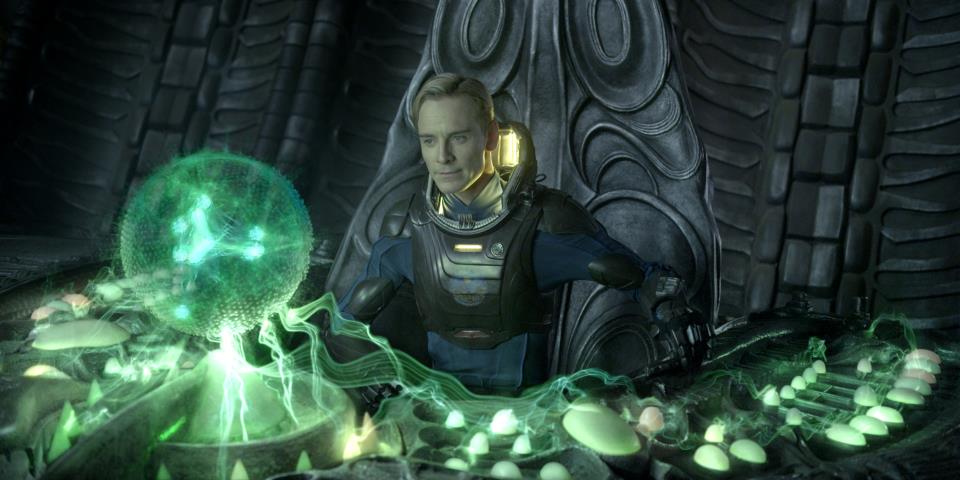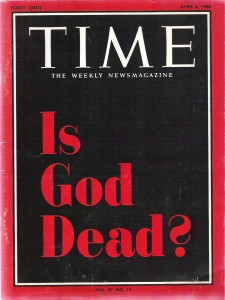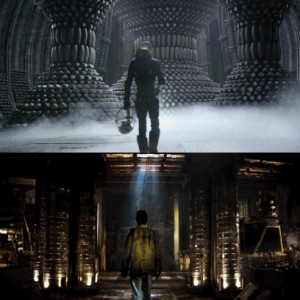“The literary works of Flannery O’Connor often contend that religious belief can only be consummated by direct confrontation with evil, and for those uncommitted and unprepared, tragedy seems inevitable. For O’Connor’s religious ‘pretenders,’ a moment of religious grace – a revelation of Truth –often does come, but at a devastating price.” – David Allen Cook, Light & Shadow: Religious Grace in two stories by Flannery O’Connor
“Grace changes us and change is painful.” – Flannery O’Connor
“The trick, William Potter, is in not minding that it hurts.” – Peter O’Toole, Lawrence of Arabia/David, Prometheus
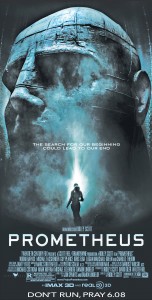 I didn’t get the chance to see Prometheus until a full week after its US release, and now this piece is being published over 5 weeks after that. In internet time this is roughly 1,000,000,000 days too late. There have been countless articles, reviews, savagings, defenses, mash-ups and memes circulated since the film premiered. So what’s the point of writing this? Well, Prometheus is still out there, pleasing some and driving others (many, many others) bugnuts. If you know me at all you know that I love a divisive work, and this film is nothing if not thoroughly and vigorously divisive.
I didn’t get the chance to see Prometheus until a full week after its US release, and now this piece is being published over 5 weeks after that. In internet time this is roughly 1,000,000,000 days too late. There have been countless articles, reviews, savagings, defenses, mash-ups and memes circulated since the film premiered. So what’s the point of writing this? Well, Prometheus is still out there, pleasing some and driving others (many, many others) bugnuts. If you know me at all you know that I love a divisive work, and this film is nothing if not thoroughly and vigorously divisive.
And so, as with most of the writing I do, I’d like to meanderingly explore this visually-impressive, idea-laden film and touch on some of what interested me about it. I’d also love to hear your thoughts, both about the film and about the insane nonsense I’ve vomited forth here. Follow me on Twitter (where one random, lucky individual will receive the secret to enlightenment via DM!) or drop your comments below and let me know what you think.
Folks ranging from “cavalorn” to John Kenneth Muir have written well on Prometheus‘ theological/mythological references and its connections to Lawrence of Arabia, among other things. If Prometheus intrigued you and you haven’t done so already I encourage you to give them a read (Muir’s thoughts on Lawrence of Arabia are especially interesting, both because he makes some good points and because it is a freakin’ phenomenal film that’s always fun to read about even indirectly). Rather than just rehash what they’ve already done well I’d like to talk a bit about Lovecraft, philosophy, symbolism, faith after God, the Human Target that is Damon Lindelof, and the importance of adding water to a baby bottle BEFORE you add the formula in because a certain husband CAN’T SEEM TO GET THIS RIGHT DESPITE WHAT’S PROBABLY BEEN 10 OR SO REMINDERS THANK YOU HONEY I LOVE YOU TOO.
As Ebert notes in his appreciative review, Prometheus harkens back to Golden Age Science Fiction – the sorts of stories, films and television shows that boldly, broadly tackled BIG HONKIN’ IDEAS about Life, The Universe, and Everything. Filtered through the distinctly stylish lens of Scott’s camera and the distinctly Catholic-yet-sneakily-Nietzschean lens of Damon Lindelof’s script rewrite Prometheus nods toward some historically-controversial, dangerous Philosophical ideas, asks far more questions than it can answer and chooses some questions that are fundamentally unanswerable. This seems to have pissed some people off (oversimplification!). While the film has a comfortably “fresh” rating on Rotten Tomatoes, you’d be forgiven for thinking it was universally hated given the vehement disappointment and derision heaped on it by various critics and non-critic-type folk.
Speaking for myself, I genuinely enjoyed it. Weeks after seeing it the film has continued wriggling about in my mind like so much primordial bio-ooze. Ridley Scott remains a gifted orchestrator of imagery and for this viewer Prometheus is far more enjoyable and accomplished than anything he’s made since Gladiator. While a number of critics are lamenting Damon Lindelof’s weaknesses as a writer I stand in admiration of his strengths. Few current writers for mainstream film and/or television invite audiences to spend time marinating in philosophical and theological ideas as consistently and as intriguingly, much less provide you the latitude and the means to investigate the nooks and crannies, influences and references of their work the way that Lindelof does.
This is not to say that Lindelof or Scott are flawless or undeserving of criticism or anything of the sort. This is simply to say that writing off Lindelof’s and Scott’s creation (Scott was heavily involved here, and pinning “blame” solely on Lindelof isn’t quite fair given what we know about their collaboration) as ultimately “simplistic” or “lazy” may be pretty simplistic, though far from lazy; some of the criticism I’ve read has been smart, detailed and insightful. I’m not looking to change anyone’s mind about the film, just to offer another perspective on some of its elements. It’s my hope that some of what follows will at the least continue the interesting discussions that Prometheus has ignited.
…Now let’s get pretentious.
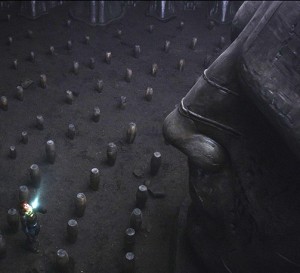 “Come, ye children, hearken unto me: I will teach you the fear of the Lord.” – Psalms 34:11
“Come, ye children, hearken unto me: I will teach you the fear of the Lord.” – Psalms 34:11
Prometheus deals gleefully and squishily in body horror – the fear of infection, loss of control, the rebellion of the body against the “self,” the primal fright of birth – and in the unease engendered by murky corporate agendas. Both of these thematic concerns are carry-overs from Scott’s original Alien. But Scott and Lindelof are also after bigger game here, game that Scott and writer Dan O’Bannon grazed upon making Alien all those years ago: Cosmic Horror in the Lovecraftian and/or Existentialist sense of the word. Scott and Lindelof are riffing in Lovecraft territory here, knowingly or not, and for this viewer the results are often thrilling and disquieting, sometimes at the same time (see: the terrifically claustrophobic game of Operation that Shaw plays on herself).
Lovecraft’s mythos posited a world of gods-as-monsters and the inevitable tragedy that befell any person foolish enough to transgress over Cyclopean thresholds. Central to Lovecraft’s stories is the fear that comes from confronting the hostility and meaninglessness of a universe filled with inscrutable entities at best uncaring and at worst actively seeking to destroy us all.
The monsters themselves were never truly the core of Lovecraft’s horror. The icy core, the central shiver-inducing conceit, was this: that we are infinitesimal beings with all the significance and import of dust motes. That seeming meaninglessness is the core of Lovecraft’s horror, and in Prometheus Lindelof and Scott aim for a similar atmosphere of helpless insignificance.
Prometheus’ Lovecraftian heart rests in the conversation between Holloway and David, in which David suggests that the Engineers created humanity simply “because they could” and that to receive such an answer from them would be a profoundly devastating disappointment to humanity. No other answer for the Engineers’ act of creation is given in Scott’s film, and so we’re left with the cold, unpalatable fact of creation without attendant responsibility, parentage defined by neglect and violence. That tragedy of “God’s” rejection and a child’s uncomprehending longing for connection is personified by the Engineers’ rejection of David, Weyland and Shaw, and by Holloway and Shaw’s pursuit of the Engineers; entities who either do not care for their creations, or who have sinister, fatal agendas for them. These are not run-of-the-mill themes for a mainstream blockbuster and I found them both interesting and troubling.
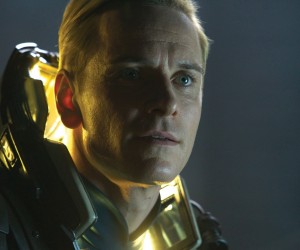 David: “Don’t all children want their parents dead?”
David: “Don’t all children want their parents dead?”
That irresponsibility toward creation is personified in the ways in which each “parent” in the film rejects it’s “child” and each “child” subsequently destroys its “parent.” Weyland rejects Vickers, his flesh and blood, for David – the child he created and can control. He also arguably rejects David, deeming him a thing without a “soul.” Holloway rejects David, his species’ “creation”. Shaw rejects the monstrous child she’s created. The Engineers reject humanity, their creation. Humanity attempts to destroy the Engineer, their creator. The proto-Xenomorph that is the Engineer’s “child” finishes the job. The scientists kill the New Testament conception of God, a God of mercy and of responsibility toward creation (aka The Father) with their discovery of LV-4815162342 and its attendant horrors (before Shaw, appropriately enough, “resurrects” God in symbolic form at the end by taking up her father’s cross again). You get the picture. Some have written this off as rote – the sort of “daddy issues” that Lindelof also dealt with ad nauseum in LOST. But the existence of “daddy issues” isn’t really the point from my humble perspective. The point is this: “God” is slain in multiple ways over the course of this movie. Which, y’know, whoa. What happens in a world where God is dead? Well, Nietzsche thought he had the answer. That answer is arguably disturbing, as well as fittingly relevant to this here motion picture we’re all fussing over.
Following Prometheus’ credits, a website address appears briefly on the screen. If you choose to visit it you will find footage of a young Peter Weyland quoting Nietzsche and a tease for the date “10.11.12”. Maybe this date is the predetermined DVD/Bluray release date or an announcement for a video game tie-in or the launch date for Prometheus breakfast cereal (DNA-altering goodness in every bite!), which is some clever/scary marketing. In any case I’m not interested in sussing out someone else’s marketing plan. I’m interested in the snippets of Nietzsche on that site, and in the book of his that’s prominently featured there: Thus Spoke Zarathustra. Here’s a link to an nice overview and summary of the book. Check it out if you’re up for it and then come on back. Or don’t. Either way, we’ll discuss.
….All caught up? Ready to follow me down the rabbit hole? Ándale, then!
“Man is something that shall be overcome. What have you done to overcome him?” – Nietzsche, Thus Spoke Zarathustra
Prometheus mirrors Thus Spoke Zarathustra in a number of fascinating ways, right down to the image of a snake burying itself in the throat of a man. Nietzsche’s book concerns a “prophet” of sorts named Zarathustra (natch) who, during the course of the book, descends from his mountain home to bring new wisdom to mankind. If that description reminds you of a certain Promethean Titan who descends Olympus to bring fire to humanity I would suggest the similarity may be less than accidental.
In Nietzsche’s book the character of Zarathustra comes to believe that humanity had experienced the death of God. In fact, with the aid of an increasingly secular society and advances in the sciences, humanity had essentially killed Him. The notion of believing in an anthropomorphic deity came to seem foolish in the face of rationalism. In Prometheus science’s discovery of the existence of the Engineers signals the death of the traditional Judeo-Christian God as the personal Creator of life on earth.
Zarathustra himself did not actually believe in the literal existence of God, but he recognized in God’s conception a centralizing, motivating force that had spurred the growth and development of (Western) civilization. Zarathustra believed that without the idea of God civilization lacked the proper engine of motivation that inspires Great Things. He feared that in the absence of a “divine” moral law mankind would fall into a state of terrible nihilism. And so Zarathustra set about preaching a new philosophy – one designed to replace that God-engine: a philosophy of the “Übermensch,” the “over-man”; of man as Superman – a secular, self-made “god.” Over the course of the book Zarathustra struggles mightily to “give birth” to this philosophy, and eventually withdraws to his mountain home to await the arrival of “worthy” pilgrims who can absorb his teachings properly.
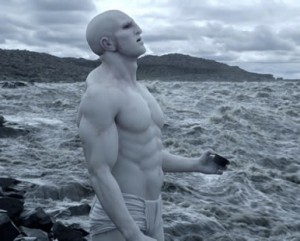 Under one interpretation Zarathustra himself is embodied by the film’s Engineers, who bring life and wisdom to mankind and then retreat to their figurative-mountain, leaving behind them the means for the worthy to come and find them. By traveling to LV-24601, the planet (moon? Do we really care?) of the Engineers, these representatives of humanity are in essence traveling to Zarathustra’s mountain just as Nietzsche’s pilgrims did, seeking a new kind of wisdom in the absence of a traditional Judeo-Christian Creator. On the evidence presented in the film the Engineers, like Zarathustra, may believe that “meekness and pity” are virtuous only to the “weak,” who resent the power and the freedom of the “strong.” They are to some extent a warrior race engaged in bio-warfare – amoral pursuits without meekness or pity. As Scott said in a recent-ish interview:
Under one interpretation Zarathustra himself is embodied by the film’s Engineers, who bring life and wisdom to mankind and then retreat to their figurative-mountain, leaving behind them the means for the worthy to come and find them. By traveling to LV-24601, the planet (moon? Do we really care?) of the Engineers, these representatives of humanity are in essence traveling to Zarathustra’s mountain just as Nietzsche’s pilgrims did, seeking a new kind of wisdom in the absence of a traditional Judeo-Christian Creator. On the evidence presented in the film the Engineers, like Zarathustra, may believe that “meekness and pity” are virtuous only to the “weak,” who resent the power and the freedom of the “strong.” They are to some extent a warrior race engaged in bio-warfare – amoral pursuits without meekness or pity. As Scott said in a recent-ish interview:
“ [the Engineers] are such aggressive fuckers … and who wouldn’t describe them that way, considering their brilliance in making dreadful devices and weapons that would make our chemical warfare look ridiculous?… I certainly would like to do another one – I’d love to explore where the hell [Dr. Shaw] goes next and what does she do when she gets there, because if it is paradise, paradise cannot be what you think it is. Paradise has a connotation of being extremely sinister and ominous.”
For all the talk about “Space Jesus” out there on the internet, the fact is that within the film itself the Engineers are portrayed as the sort of beings who don’t have much in common at all with the longhaired-hippie who offered up wisdom like “blessed are the meek,” and “blessed are the peacemakers.” They are instead the sort of beings who Zarathustra may have found to possess the sort of wisdom he strove to absorb and to spread – the wisdom of the “Will to power.” The Engineers’ invitations, scrawled on cave walls, may have been genuine in the sense that humanity was invited to find and become “like them” once they had the capability to do so; to create and to destroy and to potentially “evolve” beyond their present shapes precisely and simply just “because they can.” Because they will it. Because they’re strong enough. Or more accurately, because they might prove themselves to be strong enough. The Engineers may or may not have intended humanity’s destruction with their invitations, but they seem to have intended that mankind interact with forces powerful and inexplicable and destructive either way, and destruction is a hazard the Übermensch – Zarathustra’s “Superman” – must be willing to court, for he lives with “a self-asserting individualism that by most standards would be considered reckless and immoral.” That recklessness and a-/immorality is personified in the bodies of the fallen Engineers, victims of their own destructive creation. The will to power focused strongly on the notion of the “unexhausted procreative will of life,” and the Engineers’ bio-weapons are literalized examples of this. Based on their actions in the film it’s quite easy to view the Engineers as Ultra-Darwinists, demanding that a humanity ready to travel the stars evolve or die.
And evolution was terribly important to Zarathustra. Essential to his teaching was the idea of “becoming” – a kind of ongoing personal evolution and a rejection of the “stasis” of simple pleasures and contentment that Zarathustra saw as having replaced the “God-driven” impulse that had previously pushed progress forward. For Zarathustra life was a process, not a static state. To him, living meant overcoming yourself and transforming. Evolving. Like the perfect organism that so fascinated the android Ash, one might say. Like the bio-goo that offers up continual change and so fascinated the android David. Zarathustra emphasizes the struggle and the suffering necessary in “becoming,” and encourages people to embrace this struggle and suffering cheerfully. In other words: “The trick, William Potter, is in not minding that it hurts.”
Arguably, Weyland views himself as “becoming”; straining toward the idea of the Übermensch. “I am a law only for my kind, I am no law for all,” Weyland utters in the viral video posted on the Weyland site, quoting directly from Zarathustra and evoking the ideal of the Superman – a warrior god-king whose will to power is all that matters. This attitude is borne out in the film. Weyland uses the Shaw/Holloway expedition to achieve his own self-interested ends and where some see his selection of a substandard and/or unquestioning crew as a flaw in the narrative, I see that selection as reinforcing Weyland’s Nietzschean concern only for his own self-interest and self-preservation. What does he care whether they have a decent crew or not? He’s not interested in taking rock samples. All that matters to him throughout the film is the discovery of a living Engineer and the opportunity to beseech that Engineer ala Roy Batty. I as a viewer find his lack of care for the mission’s ostensible objectives and its crew to be obscene and selfish, but Nietzsche’s Zarathustra may have viewed Weyland instead as self-actualized, unencumbered by the meekness Zarathustra despises. Nietzsche’s book expresses disdain for sentiments of human pity, compassion, indulgence and mercy towards victims. Weyland is the sort of character who would identify with that disdain.
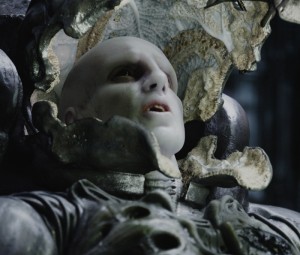 “What is great in man is that he is a bridge and not the end.” – Nietzsche, Thus Spoke Zarasthustra
“What is great in man is that he is a bridge and not the end.” – Nietzsche, Thus Spoke Zarasthustra
What is implied through the use of Nietzsche’s work in the context of what we know from Prometheus itself is tantalizing: man is not the end-point, but a bridge between ape and the “Superman,” which might be the Engineers themselves, or might be some other form of life entirely. The Engineers perhaps intended to continue “evolving” us through destruction, or to use us as a bridge to whatever “perfect organism” might result from uninhibited exposure to the stuff of life itself – the bio-goo that engenders endlessly-unfolding transformation. Looked at coldly, in the darkest Nietzschean sense, Shaw and her fellow explorers may have done humanity a disservice in stopping the Engineer from delivering his deadly payload. Perhaps they’ve halted what “should” be humanity’s evolutionary destiny – its “becoming” – at the hands of destructive forces.
Conversely, consider that the Engineers had no such regard for or foresight with regard to humanity. Consider that in approaching “Engineer Zarathustra” on his/her/its mountain, David and Weyland and humanity itself were judged unworthy to stand in the shadow of a god, unworthy to wield the power of creation and destruction. “These are not my proper companions,” the Engineer may have thought, “It is not for them that I wait here in my mountains.”
(Are you way bored yet? If so, skip down past the next three images. I’ll meet you there.)
Now consider David, Weyland’s “son” and possible Übermensch. David will never grow old, will never die. He is, for all intents and purposes, eternal. David can speak languages he’s never heard spoken, operate computers no human designed. He can ride a bike, hit a three-pointer and quote dialogue to himself at the same time. In many ways David is a “Superman.”
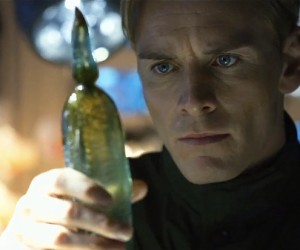 Just why does David remove the ampule from the chamber? Is he acting on Weyland’s orders? Maybe. He’s clearly following Weyland’s instructions in the film. But it’s also implied that David possesses his own independent agency – his own will to power. He does, after all, spend the beginning portion of the film consciously emulating and seemingly identifying with Peter O’Toole’s T.H. Lawrence. He does, after all, disobey direct orders several times throughout the course of the film (or does he? Check out Muir’s review for the connection between David’s apparent insubordination and Lawrence of Arabia, whose title character remarks that his behavior “looks insubordinate, but it isn’t really.”). He does, after all, negotiate with Shaw to save him from spending eternity as a disembodied head on the floor of a spaceship. It’s that act of self-preservation which makes me wonder whether David slipping Holloway the universe’s most unusual Mickey was a truly independent act – an attempt by the created to do some creating, or perhaps to enact a petty, sociopathic vengeance upon a man who sees fit to constantly belittle him. That interpretation is right there in Fassbender’s performance, lurking beneath his placid/plastic surfaces.
Just why does David remove the ampule from the chamber? Is he acting on Weyland’s orders? Maybe. He’s clearly following Weyland’s instructions in the film. But it’s also implied that David possesses his own independent agency – his own will to power. He does, after all, spend the beginning portion of the film consciously emulating and seemingly identifying with Peter O’Toole’s T.H. Lawrence. He does, after all, disobey direct orders several times throughout the course of the film (or does he? Check out Muir’s review for the connection between David’s apparent insubordination and Lawrence of Arabia, whose title character remarks that his behavior “looks insubordinate, but it isn’t really.”). He does, after all, negotiate with Shaw to save him from spending eternity as a disembodied head on the floor of a spaceship. It’s that act of self-preservation which makes me wonder whether David slipping Holloway the universe’s most unusual Mickey was a truly independent act – an attempt by the created to do some creating, or perhaps to enact a petty, sociopathic vengeance upon a man who sees fit to constantly belittle him. That interpretation is right there in Fassbender’s performance, lurking beneath his placid/plastic surfaces.
David’s actions might be viewed by some of us as immoral or at the least amoral. But here’s where things get interesting: To become Übermensch one must see “beyond good and evil”; must actually embrace “evil” with the same fervor one must embrace “good.” To become Übermensch, arguably, one must give up concepts of traditional “morality.” According to Nietzsche the goal of the Übermensch is to create his own values, unencumbered by religiously-influence notions of good and evil. To do this one must arguably surrender the figurative idea of a “soul” which could be defined as the ineffable essence of man, torn between the pull of “good” and “evil.” Who is the one character in Prometheus designated as not possessing said-soul? Who is not troubled by tasks a human workforce might find “distressing or unethical”? Hmm.
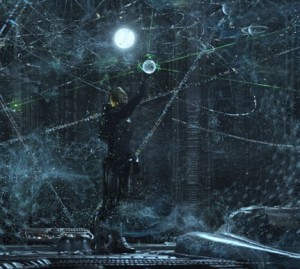 “I do not permit the sight of evil to be spoiled for me by your timidity. I am delighted to see the wonders hatched by the hot sun-tigers, and palms and rattlesnakes. Among men, too, a hot sun hatches a beautiful breed. And there are many wonderful things in those who are evil.” – Thus Spoke Zarathustra
“I do not permit the sight of evil to be spoiled for me by your timidity. I am delighted to see the wonders hatched by the hot sun-tigers, and palms and rattlesnakes. Among men, too, a hot sun hatches a beautiful breed. And there are many wonderful things in those who are evil.” – Thus Spoke Zarathustra
This could well be David’s credo. Many of the reviews of Alien and of Prometheus have suggested that the “point” of making androids Ash and David essentially amoral is to comment on the need to exercise caution w/r/t technology, but viewing these films thru Zarathustra’s lens suggests an alternate and far more unsettling interpretation: that the amorality these characters display may in fact be desirable (from Nietzsche/Zarathustra’s POV), may represent an “improvement” over humanity’s “weaknesses” of pity, compassion, indulgence and concern.
Does that frighten you? It frightens me. A world made up of amoral beings bent on self-actualization at the expense of things like humane action sounds like the definition of chaotic anarchy to me, but it also sounds like the perfect breeding ground for evolution – for creation through destruction. In multiple senses David seems the embodiment of the very ideals that Zarathustra espouses, and Ash’s comment in Alien regarding the Xenomorph could easily apply as well to David: “I admire its purity. A survivor, unclouded by conscience, remorse, or delusions of morality.”
I find this fascinating and terrifying. Nietzsche may well have found it inspiring. Nietzsche’s book is balanced on a knife’s edge between urging a new set of values and beliefs that will head off the nihilism he fears, while simultaneously courting that very nihilism with those ideas. His philosophical ideas are genuinely dangerous, and easily seized upon by men with terrible agendas. There’s a reason Hitler passed out copies of Thus Spoke Zarathustra to his troops.
Also central (arguably most central) to Nietzsche’s book is the concept of “the eternal recurrence.” Basically, the eternal recurrence is the idea that all things which have happened before will happen again (Ronald Moore’s Battlestar Galactica played with this idea; recall the line “All this has happened before, and all this will happen again.”). If time is infinite and matter is finite, then no matter how many combinations matter assumes throughout time, the same combination will recur out of sheer necessity. The concept of the eternal recurrence imagines events, places and people cycling over, again and again. It conceptualizes time as a circle, not as a straight line. What is it that Holloway says, upon witnessing the markings carved in the surface of LV-223? “God doesn’t build in straight lines.” And what does Nietzsche express through one of his characters in Zarathustra? “All that is straight lies. All truth is crooked. Time itself is a circle.”
This is a nifty idea, obviously (Futurama also played with it to clever and amusing effect), and there’s some evidence that Scott and Lindelof intended this idea to have bearing on Prometheus, given the way in which Holloway’s dialogue seems to match so well with Nietzsche’s writing. It’s also an explanation of sorts for the familiar structure of Prometheus as compared to its “parent,” Alien. What we’re witnessing is a cycle, a circle, a recurrence.
(Welcome back, bored people from 10 or so paragraphs ago.)
Before I move on, just one more thing: In Nietzsche’s book, Zarathustra has a vision of a young shepherd gagging on a serpent that’s lodged in his throat. Remind me again how that scientist with the glasses died? Something about a cobra-like alien serpent lodging itself down his throat? Yeah….
Hmm.
The thing of it is, you really don’t need the filmmakers to give you this text in order to read these larger themes and ideas into the film. Zarathustra instead offers context and potential parallels to the film. You don’t have to know anything about Zarathustra to enjoy Prometheus, but knowing something about it accomplishes two positives: (1) it makes Prometheus a potentially richer experience, and (2) now you’ve read some Nietzsche (Score! Nothing attracts the opposite sex like the smell of musty books and mentioning the phrase “eternal recurrence” – trust me on this). That’s true of all the “signposts” in this film, whether they refer to The Bible or Michelangelo’s Creation of Adam or the myth of Prometheus or whatever. They add to the experience of the film if you choose to contemplate them.
In Twitter buddy la.donna.pietra’s intelligent and thought provoking article, she notes that in contrast to Nostromo, the Joseph Conrad novel that leant a name to the spaceship featured in Alien, “Prometheus, for instance, is chock-full of Biblical references, most of which make no goddamned sense… The foot-washing scene is particularly dumb. Is Weylan supposed to be a disciple of David? Is David supposed to be Jesus? Because that’s what a literal reference to John 13:1-17 would seem to suggest.” That may indeed be what a “literal” reference to John might entail, but a literal approach to the sort of signposting done in both Alien and Prometheus may be, with respect, a wrongheaded approach.
Pietra’s use of the Nostromo name in Alien as an example of a “good” outside reference that enhances the experience of Alien is really well articulated (far better articulated than this spiraling mess/descent into madness) but doesn’t really address that it’s entirely possible to look at that reference and call it “lazy” for exactly the same reasons. That reference could refer to colonialism. Or to the corruption present in Weyland Yutani’s motives. Or to the dangers of materialism. Or to the illusion of civilization. It could refer to etc. etc. yougetthepoint.
Lindelof’s use of foot washing, and Scott/O’Bannon’s use of the “Nostromo” name serve virtually identical purposes: to signpost a reference to a somehow-related work and to let the audience figure out just what they think it “means.”
I choose to believe that the washing of Weyland’s feet is there to serve one ascertainable, thematically apt purpose: to remind the audience of the responsibility to one another that this ancient gesture symbolizes, and to contrast the image itself with the ways in which Weyland rejects that responsibility specifically, and generally, the ways in which most every parent and child similarly reject it.
Christ washes the feet of his apostles to show that he is of them, not above them. Similarly, Christ has his feet washed by a woman in a display of humility and service. David is neither truly humble, nor truly servile, and so his washing of Weyland’s feet serves as a continuing question mark regarding his feelings for his creator. Similarly, Weyland is neither humble nor servile, and has sought this mission purely out of self-preservation and personal need. He has no interest in figuratively washing the feet of his fellow travelers, nor in showing respect or servility to his creator. Oh, and hey: when the woman in John 12 washes Christ’s feet and perfumes them she’s readying him for his passion and burial (John 12:7 – “It was intended that she should save this perfume for the day of my burial.”). Similarly, David is preparing Weyland to “meet his maker,” which will involve his death.
One other example:
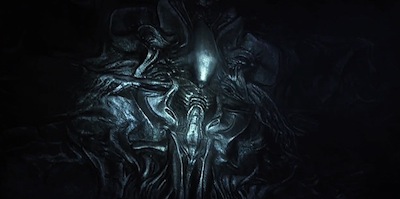
Christianity’s most befuddling, bewitching contradiction – that death is the key to life – is also one of Prometheus’ primary preoccupations both literally and figuratively. Note that the alien mural located in the “Ampule Room” evokes the image of Christ on the cross – the primary symbol of the death-as-life idea in the Christian faith. The film’s recurrent theme of self-sacrifice, embodied, at various points in the narrative, by the Engineer who appears to destroy himself in order to jumpstart new forms of life, by Holloway’s suicide-by-flamethrower, by Janek’s kamikaze maneuver, evokes the sacrifice that “God” figures like Christ, Osiris, and Prometheus undertake on mankind’s behalf.
The Alien film series is centered on a dark mirror of this sacrifice; the notion of death-as-birth, creation through destruction. Whether it be the “birth” of the first Xenomorph via John Hurt in Scott’s original, Ridley’s role as surrogate mother in Aliens and the Queen Xenomorph’s role as Mother to her monstrous brood, Ripley’s “impregnation” in Alien 3, Ripley’s unfortunate, albino lovechild in Alien:Resurrection, or Shaw’s horrifying caesarian birthing sequence in Prometheus, death-yields-horrifying-life is the truest, most consistent “life cycle” in the Alien series. Bookended by scenes of godlike Engineers dying in the act of bringing forth new life, Prometheus reflects that death-birth cycle in numerous ways, but introduces a purposeful and ominous ambiguity, asking the audience to reflect on the many definitions of “sacrifice.”
…which brings us – in my patented, roundabout way – to Shaw’s cross. Is her reclamation of that artifact a clumsy, empty bit of symbolism? Sure, from a certain point of view. It depends, appropriately enough, on what you choose to believe.
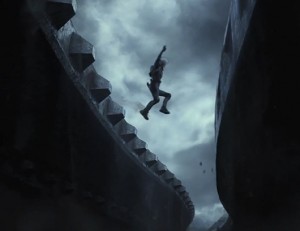 “No longer a given, faith becomes a choice, a matter of interpretation.” – Richard Kearney, Anatheism: Returning to God after God
“No longer a given, faith becomes a choice, a matter of interpretation.” – Richard Kearney, Anatheism: Returning to God after God
There’s a meaninglessness to what Shaw has discovered over the course of Prometheus – a terrible yawning emptiness to her discovery’s full implications – and her father’s cross offers semblance of meaning; a small internal restoration of order. For me, Shaw’s return to the cross represented a tiny but potent victory against despair and existential nihilism.
This approach to faith – faith in the face of the “death of God” – has been tackled by the eminent Catholic philosopher Richard Kearney in the form of an “anatheistic wager.” Bear with me and I’ll try (try!) to explain. Kearney characterizes “Anatheism” as “a movement of return,” a “primordial wager…at the root of belief” concerning a way to have faith involving a “wise wager” in the face of the death of capital-F Faith. It is a surrendering of the anthropomorphic, metaphysical God – the God who dies in Thus Spoke Zarathustra – in favor of “God as a principle of goodness that has no power to prevent evil but is actualized whenever good is done” (Good such as figuratively washing your neighbor’s feet by, for instance, serving as a doctor to people who need one the way that Shaw’s father does). Kearney’s anatheistic wager is both existential and philosophical (two favorite topics for one Mr. Lindelof), both rational and irrational. It attempts to establish a middle way between blind faith and pure reason. Central to the idea of Kearney’s wager is the notion that “interpretation goes all the way down…There is no God’s eye view available from nowhere.” This notion is reflected in Shaw’s evolving faith. As Shaw notes the Engineers’ act of creation does not preclude the existence of a God above them. It in fact opens up a series of potentially-endless theological Russian Dolls. If the Engineers created us, who created the Engineers? And who created the creators of the Engineers? And so on and so forth until it’s turtles all the way down, baby; interpretation all the way down.
As Kearney writes: “the anatheist moment is one available to anyone who experiences instants of deep disorientation, doubt or dread, when we are no longer sure exactly who we are or where we are going…” That moment arrives for Shaw in her confrontation with the Engineer. And in that moment, Shaw makes a choice. She reclaims a symbol that has positive, humane meaning for her to a situation that has none. Belief for Shaw is consummated, ironically and somehow fittingly, upon confronting her uncaring and/or vengeful creator and finding him/her/it wanting. And in this encounter faith is “No longer a given, faith becomes a choice, a matter of interpretation.” Viewed through this lens Shaw’s reclamation of her cross attains a kind of mournful beauty. As Brian Treanor notes in his article, The Anatheistic Wager: Faith After Faith, “Just as ‘childlike’ faith in an anthropomorphic God should eventually cede to a more mature faith that appreciates the role of indirect poetic communication in accounts of the divine, naively accepted faith unaware of its own contingency should eventually – after a passage through doubt or unbelief brought about by awareness of contingency – undergo a metamorphosis into a second innocence, unlike the first because it is chosen rather than (merely) received.” Shaw’s reclamation of her father’s cross can be said to represent an embrace of her own so-called “insignificance” – a recognition of the yawning, Lovecraftian emptiness offered up by the Engineers, and a choice to refute that insignificance. It also serves as a refutation of the Nietzschean philosophy that seems to suffuse both Weyland and the Engineers.
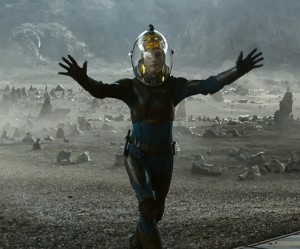 Not everyone can, will, or should have that reaction – some of us are atheists or non-Christian or simply not disposed to view faith-in-process as inherently dramatic or inherently inspiring. But what I think I enjoy most about Shaw’s “anatheist” moment is its arguable ambiguity of meaning. The reading I offer is certainly not the only reading. It’s equally possible to read Shaw’s reclamation of her cross as a tragic denial of what she’s discovered – a purposeful blinding of sorts to the awful “truth” that Weyland offers David near the film’s conclusion: “There’s nothing.” What’s important, ultimately, is that Shaw makes her choice. We decide if she’s “right,” and whether the choice is tragic or triumphant.
Not everyone can, will, or should have that reaction – some of us are atheists or non-Christian or simply not disposed to view faith-in-process as inherently dramatic or inherently inspiring. But what I think I enjoy most about Shaw’s “anatheist” moment is its arguable ambiguity of meaning. The reading I offer is certainly not the only reading. It’s equally possible to read Shaw’s reclamation of her cross as a tragic denial of what she’s discovered – a purposeful blinding of sorts to the awful “truth” that Weyland offers David near the film’s conclusion: “There’s nothing.” What’s important, ultimately, is that Shaw makes her choice. We decide if she’s “right,” and whether the choice is tragic or triumphant.
Damon Lindelof’s work is all about that choice. I spent a good amount of time writing about LOST when it aired, and that essential human choice of what to think and believe haunted every hour of that show. It’s fair to say that Lindelof seems fascinated by the idea of faith-in-process, besieged and tested and misplaced and lost and hard-won; of faith after Faith. The recent announcement that Lindelof intends to adapt for HBO Tom Perotta’s book The Leftovers, about the aftermath of a Rapture-like event, further cements that opinion (and look for me to write about it if it ever becomes a reality). In some ways his work is not dissimilar to Flannery O’Connor, whose stories often placed flawed people in extreme situations which harmed them physically and/or mentally in order to offer up to them a moment of real Truth by which they might find some illumination. Complaining that Lindelof’s interest in these ideas is somehow crippling or limiting is a little like saying that you wish O’Connor (say her name three times and she will appear, like the Candyman, all full of wrath and bees!) would write about something other than religion for a change.
Consciously choosing “meaning” over “meaninglessness,” the juxtaposition and examination of the morality of science and faith/religion, the idea that while faith might be nothing but lies it may still be worth possessing in order to make sense of a vast, pitiless universe, a Flannery O’Connor-esque focus on the real and necessary pain that results from seeking “Grace” (i.e. Truth), the Vonnegut-esque critiques of both science and religion have become hallmarks of Lindelof’s work. He may fumble as he reaches toward this stuff, but few others working in mainstream film or television have attempted to fuse pop culture forms and Philosophical/Theological ideas with the same degree of admirable humility, humor and intelligence. Lindelof’s work is weird yet accessible, smart enough to be dangerous, playful and strange. If Lindelof wants to make weird big-budget sci-fi/fantasy out of Nietzsche and O’Connor I say let him work. It’s not my money. Let him be weird and smart and playful and strange in the handful of projects he writes.
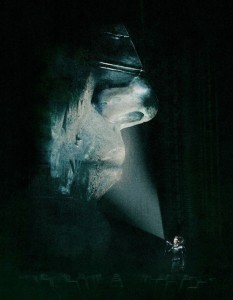 All of this pseudo-intellectual blather and posturing doesn’t change the face that many people simply think that Prometheus doesn’t work as a movie. No amount of self-important blather can make you like a film you just plain disliked. That’s cool. Like I said: I’m not looking to change anyone’s mind. Besides, are there flaws here? Oh yes. Prometheus contains the single most unbelievable character moment I’ve seen in years – a moment so silly, so flat-out dumb, that it demands an answer from its makers. You all know what I’m talking about. It involves a “scientist” (never have I used this word so loosely) encountering a clearly hostile alien life form and attempting to…pet it? Befriend it? Whateverthefuck he’s trying to do it defies logic, reason and basic human self-preservation on so many levels that it’s mind numbing/jaw dropping/[insert appropriate bodily affliction].
All of this pseudo-intellectual blather and posturing doesn’t change the face that many people simply think that Prometheus doesn’t work as a movie. No amount of self-important blather can make you like a film you just plain disliked. That’s cool. Like I said: I’m not looking to change anyone’s mind. Besides, are there flaws here? Oh yes. Prometheus contains the single most unbelievable character moment I’ve seen in years – a moment so silly, so flat-out dumb, that it demands an answer from its makers. You all know what I’m talking about. It involves a “scientist” (never have I used this word so loosely) encountering a clearly hostile alien life form and attempting to…pet it? Befriend it? Whateverthefuck he’s trying to do it defies logic, reason and basic human self-preservation on so many levels that it’s mind numbing/jaw dropping/[insert appropriate bodily affliction].
But I’ll be honest – that’s the sole moment in this film that truly feels deserving of the scorn that’s been heaped on the entirety of the film and its “scientists”. Would an archaeologist take his helmet off on an alien world? Maybe, if the android dedicated to their safety told him it was safe to do so. Is it smart? No. Would Holloway really be whining over not getting to talk to the Engineers after a single day? Maybe, if speaking with them is what he’d spent the past few years dreaming about, and it seems that it was. Why is the medical pod only configured for men? Because it’s reserved solely for the treatment of Weyland. I’d like to ask you to think about that, and about what it says regarding his concern for his own daughter. The “snakecharming” scene is the one moment that really bites my biscuit in a big way – but that’s not nearly enough to make me dismiss what Prometheus does well, which for me is a lot of stuff.
In addition to all of the whiz-bang excitement of Friedrich Nietzsche (what? It’s just me?) and the rollercoaster thrill of Christian symbolism (it’s just me) Prometheus is often tense and creepy, surprisingly funny at moments, breathtakingly beautiful to look at, visually “poetic” in ways that filmgoers rarely get the chance to see in big-budget mainstream films. Whether it’s the haunting vision of ancient digitized Engineer “ghosts” running away from some unseen threat or David’s discovery of the Engineers’ star charts or the team’s first looks at the terraforming dome or their use of the “mapping tech,” or the first foray into the Ampule Room, Prometheus is chockablock with dynamic, evocative imagery captured with technical prowess and aesthetic finesse. It features gorgeous, practically-created environments – the kind that rarely gets built anymore, let alone showcased the way that Scott showcases these. Another filmmaker would have created the Ampule Room using CG-augmented sets. And it would have been a massive mistake. What we get instead is a real, tangible environment that reminds me of what Anton Furst or Nazi architect Albert Speer might have created if they were alien Engineers.
Which is fitting, actually. I mean, what else is the Engineers’ dome but the housing for a weaponized eugenics program?
We can disagree good-naturedly all day over whether Prometheus stuck the landing/screwed the pooch/stuck the pooch/screwed the landing. I enjoy that conversation. What gets my dander up are claims that Prometheus is TERRIBLE. That That’s the sort of talk one hopefully reserves for actually terrible films (May I direct your attention to Alvin and the Chipmunks? To Domino? To Year One? To Pandorum?). Prometheus is more than competently made, well-acted, impressively-designed and obviously considered.
Is it “as good as” Alien or Aliens? No, Prometheus is a different beast. It’s not a “perfect organism,” self-sustaining, sleek and lethal like Alien and Aliens. It’s a messily evolving thing with DNA that asks to be decoded. To my mind Prometheus tells a complete tale of humankind’s need for meaning. Prometheus isn’t 2001 or Solaris, but it shares with those films an admirable tendency to give over its mythology and ideas to the minds of its audience. It gives those minds space in which to play. Decoding that stuff is part of the pleasure here for some. Doing some “heavy lifting,” as /Film’s Adam Quigley characterized things in his review, can yield satisfying rewards. So many films are depressingly over-articulated, the screenplays doing everything but literally holding your hand and walking you from scene to scene, double-checking every twenty minutes to make sure no one’s been left behind. It’s refreshing to me to have a film this big budget take a different tact in this age of four-quadrant synergy.
I realize that talking about all of this at this length in the context of a movie with rubbery squid monsters and a sharply-divided audience probably makes me sound like a self-important douche, but I’m not talking about it because I think it makes me sound smart. It doesn’t. I’ve met Smart. Smart I am not. I’m talking about it because, for God-knows-what reason, I think all of this stuff is interesting. I think it makes the film more interesting. I think that at least some of this stuff is intentional. Other things are unintentional, but eerily appropriate. And while I’ve clearly spent far too much time thinking about all of this in a room that appears to be closing in on me it’s taken you, what? 10-15 minutes to read it? If you think you just wasted 10-15 minutes of your life you can bail now on the discussion. Give Prometheus exactly no more brain space. If you’d given me money for this rambling monologue I’d gladly return it to you. I bid you calm seas. May you rest well and dream of large women. Or stay, and tell me just how monumentally full of bullshit I am. Do it intelligently, preferably. Or maybe you’ll tell me what your interpretation is. Maybe you’ve got your own insane interpretations. Maybe you want to build off mine. Go for it, please. I love it when a film – flawed or terrible or good or great – provokes a real and complicated response and Prometheus has done just that. Passionate conversation is one of the things I love most about art and entertainment.
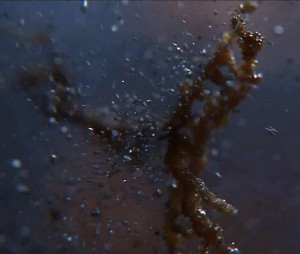 Prometheus isn’t a perfect film by any means, but I don’t always want “perfect” films – especially mainstream big budget films. Sometimes I want bold, messy, imperfectly ambitious films that succeed by existing; films that provoke discussion and invite argument and keep friends up at night afterward trading speculation, criticism, compliments, and ideas. I don’t so much care if films like these “stick the landing” so much as I care about enjoying the attempt at flight. I want Hollywood films unafraid to fall on their nonexistent-faces because they aimed too high and flew too close.
Prometheus isn’t a perfect film by any means, but I don’t always want “perfect” films – especially mainstream big budget films. Sometimes I want bold, messy, imperfectly ambitious films that succeed by existing; films that provoke discussion and invite argument and keep friends up at night afterward trading speculation, criticism, compliments, and ideas. I don’t so much care if films like these “stick the landing” so much as I care about enjoying the attempt at flight. I want Hollywood films unafraid to fall on their nonexistent-faces because they aimed too high and flew too close.
…Maybe Scott and Lindelof should have named the ship Icarus.
